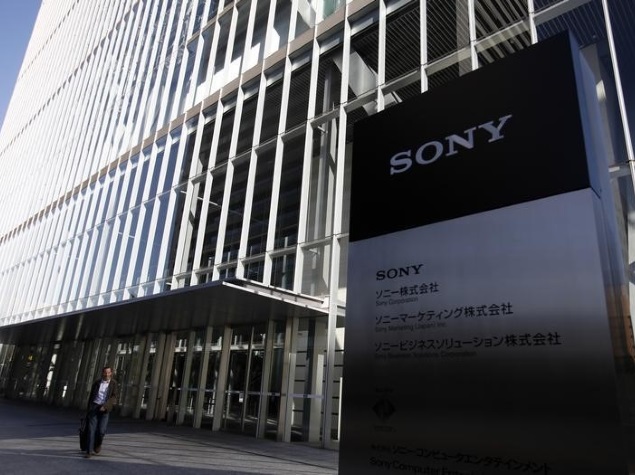- Home
- Games
- Games News
- Sony Hopes for PlayStation Profit Boost as Smartphone Unit Struggles
Sony Hopes for PlayStation Profit Boost as Smartphone Unit Struggles

The head of Sony Corp's PlayStation division hopes to raise its profit outlook for this year, in stark contrast to the Japanese electronics firm's mobile business which has forecast deep losses and sent Sony's stock reeling.
With Sony's three core electronics businesses - the third is imaging - looking increasingly lopsided, the company is having to shrink and restructure in mobile, and focus its growth hopes on image sensors and the 20-year-old PlayStation games console.
Buoyed by strong sales of the latest PlayStation 4 and the rollout of games and content for its network services, Sony Computer Entertainment CEO Andrew House hopes he can again raise the division's profit forecast for the year to end-March. Sony pushed up that forecast in July to 25 billion yen ($230 million) from 20 billion yen.
"We raised our profit prediction and I hope that's a trend we can continue, even within this fiscal year," House told Reuters in an interview on Thursday, adding his unit's profits looked certain to increase next year from this year's levels.
Sony has sold 10.3 million PlayStation 4 consoles as of September 6, almost double the sales of Microsoft Corp's Xbox One, and well ahead of the 7.2 million WiiU's sold by Nintendo Co Ltd, according to market research firm VGChartz.
House's upbeat comments came a day after Sony's struggling smartphone division announced a 180 billion yen impairment charge, triggering the company's sixth profit warning in two-and-a-half years. It also said it would not pay a dividend this year - the first such move since its 1958 listing.
Shares rocked
While Sony had warned in July of a potential charge, the axing of the dividend stunned investors and sparked an 8.6 percent drop in Sony shares to 1,940 yen. That ended a 25 percent rally in the share price over the past six weeks as confidence grew in Sony's restructuring plans and its prospects in growth markets such as automotive sensors.
Sony will cut another 1,000 jobs, around 15 percent of its headcount, in its smartphone business, where it's up against fast-growing Chinese manufacturers such as Xiaomi Inc as well as established names such as Apple Inc and Samsung Electronics Co Ltd.
"If the company were to go through further restructuring, it needs cash, so from this perspective it makes sense that the company's not paying dividends," said Mitsushige Akino, chief fund manager at Ichiyoshi Asset Management.
Sony's move also sparked a surge in the price of insuring its debt against default, with its 5-year credit default swaps rising 40 percent compared with levels prior to the profit warning.
And Standard & Poor's, the only leading credit ratings agency to retain an investment-grade rating on Sony debt, put the company's credit on review for a possible downgrade to junk status. "We believe it will not be easy for Sony to maintain brand recognition and generate stable profitability in this competitive market," S&P said of Sony's smartphone business.
Network spending
The mobile unit's woes will mean greater scrutiny of the PlayStation's profit performance, which has typically been erratic - swerving from steep losses as Sony spent heavily to develop new consoles to strong profits when those consoles reached peak popularity.
Sony CEO Kazuo Hirai - House's predecessor - has said he hopes the PlayStation 4 can recapture the profit levels of the PlayStation 2, the best-selling game console which at its peak earned Sony more than $1 billion in annual operating profit.
While House declined to be drawn on specific numbers, he touted bright profit prospects at the game division, which brings in 10-12 percent of Sony's revenue, and aims to boost monthly revenue per user from services such as online games, which offer a steadier stream of income than one-off purchases of hardware and software.
(Also See: Sony Warns of $2.14 Billion Annual Loss, Over 4 Times Its Forecast)
"I do feel we have a higher opportunity to build a higher ARPU (average revenue per user) than with the PS3, and that should make a very strong profit contribution over the life-cycle," he said.
He warned, however, that profitability of the game division, which had been combined with network services such as streaming video and music as well as games, would be constrained in the near term as Sony needs to invest in its network infrastructure over the next 12-18 months.
He denied there was pressure for the games division to take up the slack for the mobile business, and noted that both Hirai and CFO Kenichiro Yoshida's background in games and networking was favourable for his business.
"Kaz obviously comes out of the games business. He was in that for 10 years in the States and has a deep understanding of what a healthy ecosystem looks like and what we have to do," said House, a 49-year-old Briton who has worked at Sony for more than two decades. "I think Yoshida coming in as CFO has been hugely beneficial for us. He comes from a network services business."
House said Sony's cloud-based TV service, due to launch in the United States this year, was an opportunity to expand the user base of its network services, now at 52 million - a fraction of Apple's 800 million or so iTunes users. Sony is also looking for more content providers after signing a deal with Viacom to stream 22 of its channels.
For some analysts, the contrasting fortunes of Sony's business pillars was not necessarily a bad thing.
"This has shown that a sensible CFO is able to control the expansionary aspirations of business heads, which if unchecked, would lead to larger losses for Sony," said Atul Goyal, analyst at Jefferies.
© Thomson Reuters 2014
Catch the latest from the Consumer Electronics Show on Gadgets 360, at our CES 2026 hub.
Related Stories
- Samsung Galaxy Unpacked 2025
- ChatGPT
- Redmi Note 14 Pro+
- iPhone 16
- Apple Vision Pro
- Oneplus 12
- OnePlus Nord CE 3 Lite 5G
- iPhone 13
- Xiaomi 14 Pro
- Oppo Find N3
- Tecno Spark Go (2023)
- Realme V30
- Best Phones Under 25000
- Samsung Galaxy S24 Series
- Cryptocurrency
- iQoo 12
- Samsung Galaxy S24 Ultra
- Giottus
- Samsung Galaxy Z Flip 5
- Apple 'Scary Fast'
- Housefull 5
- GoPro Hero 12 Black Review
- Invincible Season 2
- JioGlass
- HD Ready TV
- Laptop Under 50000
- Smartwatch Under 10000
- Latest Mobile Phones
- Compare Phones
- Red Magic 11 Air
- Honor Magic 8 RSR Porsche Design
- Honor Magic 8 Pro Air
- Infinix Note Edge
- Lava Blaze Duo 3
- Tecno Spark Go 3
- iQOO Z11 Turbo
- OPPO A6c
- Lenovo Yoga Slim 7x (2025)
- Lenovo Yoga Slim 7a
- Lenovo Idea Tab Plus
- Realme Pad 3
- Moto Watch
- Garmin Quatix 8 Pro
- Haier H5E Series
- Acerpure Nitro Z Series 100-inch QLED TV
- Asus ROG Ally
- Nintendo Switch Lite
- Haier 1.6 Ton 5 Star Inverter Split AC (HSU19G-MZAID5BN-INV)
- Haier 1.6 Ton 5 Star Inverter Split AC (HSU19G-MZAIM5BN-INV)







![[Sponsored] Haier C90 OLED TV | Dolby Vision IQ, 144Hz OLED and Google TV in Action](https://www.gadgets360.com/static/mobile/images/spacer.png)









